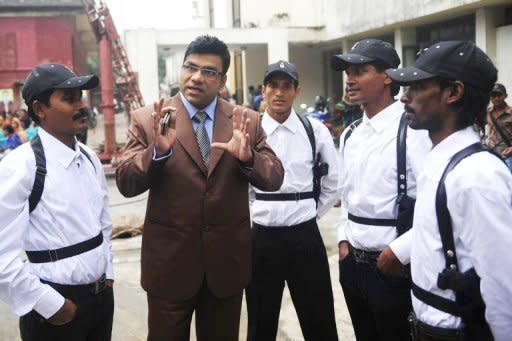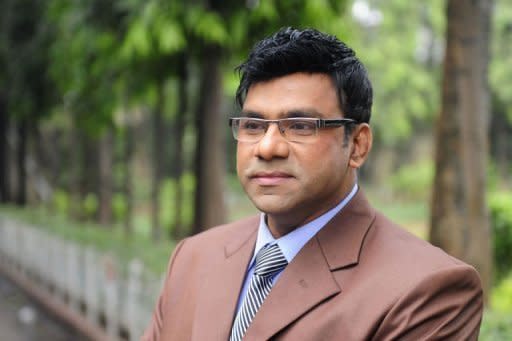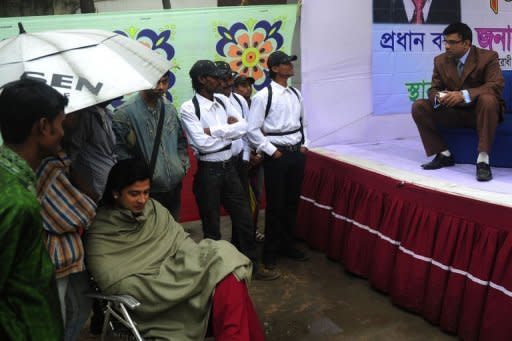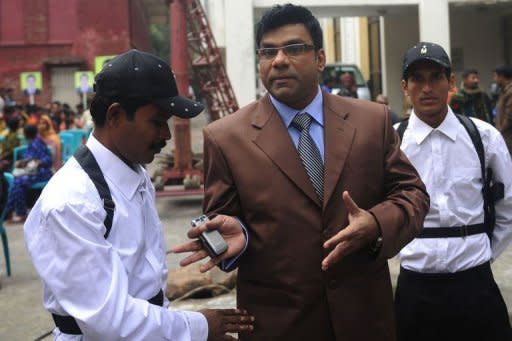The baddest baddie in Bangladesh
Whenever Misha Shawdagar appears on screen, things always turn nasty. Bangladesh's "baddest baddie" has acted in over 750 films -- and he is proud of being typecast as the nation's number-one villain. "Eighteen years ago I started with the dialogue: 'you bloody swine'. And I've never looked back," Shawdagar told AFP on the set of his latest movie, "Amar Challenge", which will be his 765th bad-guy role. In the film, he plays a ruthless political activist who is determined to rise to the top through any means -- even offering his wife to a senior government minister. "It will take me six or seven years to reach 1,000 films. After that, I'll check with the Guinness Book of Records whether I can have an entry," he said, as he changed into a dark suit to play a gangster on another set next door. Shawdagar is indispensable for directors who call him a "full package" for being a one-man solution for all sorts of baddies: thugs, mafia dons, mass killers, corrupt officials, feudal lords or rogue tycoons. "The directors can't do without me. All my rivals are either dead, or have been made redundant because of my success," he said, recalling parts as a villain with blazing red eyes and even one who had lost a leg. Most Bangladeshi movies are unabashed copies of Indian Bollywood hits, focusing on old-fashioned formula stories of unrequited love, or a hero fighting for justice against the odds. But rapid social change in the country has also meant demand for film plots based in one of the huge garment export factories or in urban slums, rather than in sleepy villages. "This age requires modern baddies who can use a rocket-propelled grenade or a machine gun or who know how to fight kung-fu. In one recent film, I was cast as a mass killer who buries people alive," said Shawdagar. Shawdagar, 46, began his career in 1990 as a hero after he was discovered in a talent search by a state-owned film agency. But soon, after a few flops, a director persuaded him to be a villain because of his height and deep voice. "I told him I don't want to be an old-styled Bangladeshi villain," he said. "I wanted to be a Mumbai-styled villain with idiosyncrasies or mannerisms like stammering at a particular word. I even invented some mannerisms on my own, which became hugely popular." Last year Shawdagar had five blockbusters -- the best tally by any local actor -- and he still insists on doing many of his own stunts. These days he is mobbed by people whenever he visits Dhaka's markets or its public parks and by fans waiting outside the city's film studios, and he also has a popular sideline starring in television advertisements. "They want to touch me to see whether I am real. Many are amazed when they saw me reading a book or wearing a Muslim skull-cap in my car," he said, as he shooed away half a dozen fans swarming around his Toyota Corolla. Despite his fearsome on-screen persona, Shawdagar is a devout religious man who always carries prayer beads. He has two teenage children, and does charity work by paying for poor people's weddings. His success, he says, is down to his muscular build, healthy lifestyle and trademark long moustache, as well as his acting. "I am fit because I don't have so-called 'filmy' diseases," he said, referring to the drinking and womanising reputed to be ripe among the acting set in Bangladesh. This year Shawdagar adds his most controversial role yet to his vast repertoire of baddies: an Islamic terrorist launching a "jihad" (holy war) with bombs and grenades in 2005. "The Bangla Bhai", named after the country's most notorious Islamic terrorist, portrays the life of Siddiqur Rahman, a leader of the Jamayetul Mujahideen Bangladesh (JMB) group that is blamed for many deadly attacks. "I took up the role despite the danger because someone should portray this man. Unless we saw Hitler in films, we wouldn't know what kind of danger he posed to the world," he said. "To be honest, I am a bit afraid. Bangla Bhai has been executed, but his sympathisers may still be there. As a Muslim, it's my duty to unmask the false jihad of these groups," he said. The government's censor board has asked the director to change the movie's title and cut some scenes out of concern it may spark violent reprisals. The biggest threat now to Shawdagar's dream of acting in 1,000 baddie roles is the decline of Bangladesh's local movie industry as Bollywood imports take over. "Cinemas are closing because of poor quality films. Who wants to see same old plots when you can see a better Hindi version in bootleg CDs or TV channels," said film critic and historian Anupam Hayat. But Shawdagar defends the domestic industry. "Some ridicule us, saying we churn out the same old pieces time after time, like garment girl falling in love with tycoon's son," he said. "The so-called art films can earn some praises, but they don't sell."





